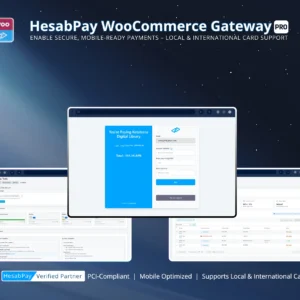Ensuring Reliable Webhook Connectivity for Enterprise Stores
Webhooks are critical for validating transaction status. Connectivity issues can lead to unprocessed orders, delayed fulfillment, or inaccurate reporting.
How Connectivity Issues Occur #
-
Firewall or security plugins block HesabPay server IPs.
-
Non-HTTPS webhook endpoints.
-
SSL certificate misconfigurations.
-
Conflicts with other plugins or hosting server settings.
Implementation Steps #
-
Test webhook endpoint in WooCommerce → HesabPay → Webhook Test.
-
Verify HTTPS endpoint and valid SSL certificates.
-
Whitelist HesabPay IPs on the server.
-
Enable debug logs to track webhook delivery and failures.
Enterprise Tip #
Automate webhook health monitoring in staging and production environments. Use alerts to notify admins of failed webhook attempts.
Testing and Validation #
-
Place test orders in Sandbox mode and confirm automatic order status updates.
-
Check for log entries labeled “Webhook Received” or “Webhook Failed.”
-
Validate timestamp accuracy and response integrity for each webhook call.
Maintaining Webhook Health #
-
Rotate API keys periodically and disable old/test webhooks.
-
Implement IP whitelisting, firewall, and WAF rules to protect the endpoint.
-
Monitor logs regularly for unusual patterns that may indicate network or security issues.
Conclusion:
Reliable webhook connectivity ensures all orders are validated and reduces risk of failed or fraudulent transactions, securing the enterprise payment ecosystem.



